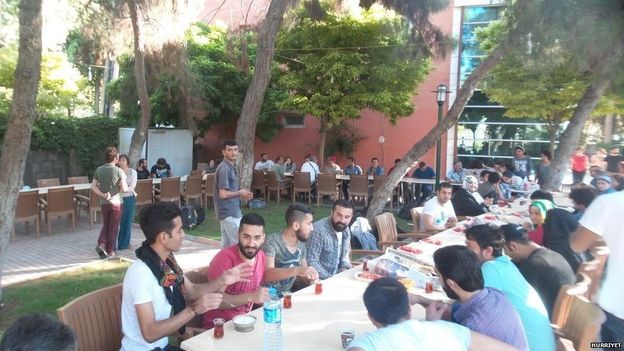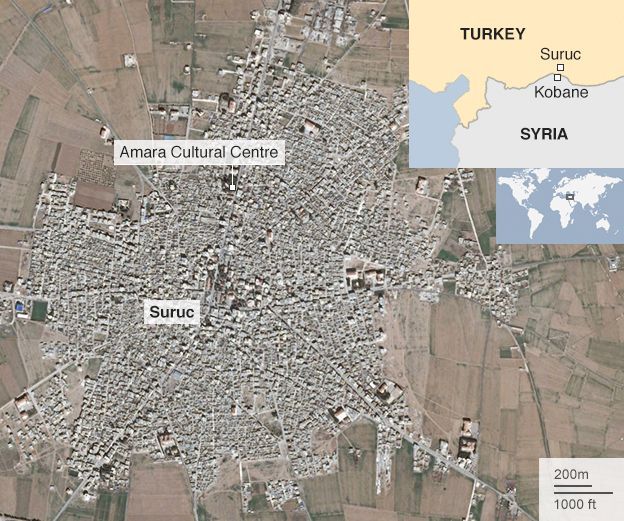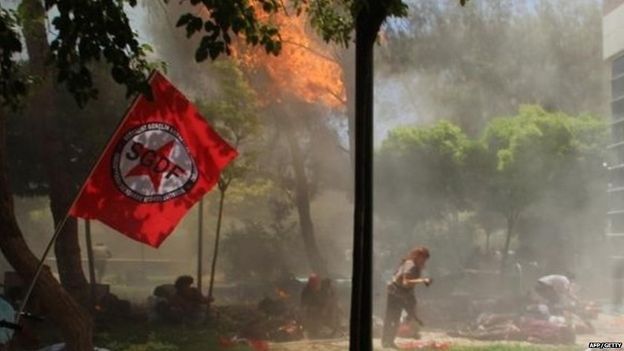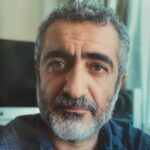
Young socialist activists on their way to rebuild the Syrian-Kurdish town of Kobani were blown up by suspected Islamic State (IS) sympathisers.
Turkish officials told Reuters they have received evidence saying it was a suicide blast carried out by Islamic State militants.
A woman suicide bomber has detonated a bomb at a meeting held in a Kurdish cultural centre in Suruc close to the border with Syria.
Young activists were holding a press conference at the meeting to discuss the reconstruction of the neighbouring Syrian town of Kobane. The explosion killed at least 30 activists and wounded a 100 more. The Syrian town of Kobani across the border has seen heavy fighting between the local Kurdish fighters and IS militants. The Kurds have the upper-hand in Kobani at the moment, but a shock assault with suicide bombers could come at any time.
It appears the suicide attack came 10km north in the Turkish town of Suruc on Monday. The Turkish government is preparing to wake up to the fact that the threat of IS attacks could fragment Turkey.

BYPASS THE CENSORS
Sign up to get unfiltered news delivered straight to your inbox.
You can unsubscribe any time. By subscribing you agree to our Terms of Use
The BBC reports:
Kobane has seen heavy fighting between IS militants and Kurdish fighters.
It was retaken by the Kurds from IS forces earlier this year.
President Recep Tayyip Erdogan has condemned the bombing and described it as “an act of terror”.
Suruc houses many refugees who have fled the fighting in Kobane.
IS overran the Syrian town in September last year, but it was retaken by Kurdish forces in January.
In June Kobane once more came under assault from IS, with hundreds dead, but the militants were driven out again.
The district governor of Suruc, Abdullah Ciftci, said: “The fact that it is a suicide attack increases the possibility that IS is responsible.
“We think the attacker was a woman.
“Preliminary findings show that she was acting on her own,” he told BBC Turkish.
Turkey’s Prime Minister Ahmet Davutoglu said that the country would be increasing security measures along its border with Syria, Reuters reports.
The Federation of Socialist Youth Associations (SGDF) is reported to have had at least 300 members staying at the Amara Culture Centre in Suruc, where the explosion happened.
The young people had been planning to travel to Kobane to help with rebuilding the town.
A photo taken earlier in the day showed members of the group relaxing in the garden.
A video released on social media apparently showed the moment of the blast.
In the video, a group of young people are chanting slogans while holding the federation’s flags and a large banner with the words: “We defended it together, we are building it together.”
Then an explosion rips through the assembled youngsters.

Graphic images of the aftermath show bodies littering the ground, with the red flags being used to cover them.
A statement from the Turkish interior ministry said: “We call on everyone to stand together and remain calm in the face of this terrorist attack which targets the unity of our country.”
A local journalist, Faruk Baran, told BBC Turkish that there was panic in Suruc after the attack, with shopkeepers closing up for fear of a second attack.
Suruc residents had feared that they could be IS’s next target ever since the attack on the pro-Kurdish party’s election rally in Diyarbakir on 5 June, he said.
Other eyewitnesses told BBC Turkish that in the immediate aftermath of the attack, local council vans roamed the streets and warned people to stay away from crowded areas, announcing that there might be a second suicide bomber around.
…………………..
Analysis: Jiyar Gol, BBC regional expert
The suicide bomb attack on the Amara Cultural Centre is one of the bloodiest suicide attacks in Turkey in years.
Suruc is a small Kurdish-majority city just a 15 minute drive from the border with Kobane. Kurdish activists in Suruc played a vital role during the siege of Kobane, sending food and medicine to the YPG Kurdish fighters to bolster their supplies. Many journalists and foreign fighters who wanted to go to Kobane went to Suruc and from there were sent on.
At the time of the attack, 300 young activists were preparing to make a statement and cross the border into Kobane to help to rebuild the city.
Local Kurdish politicians in Suruc blame the Islamic State (IS) group for the attack. IS suffered a heavy loss and defeat in Kobane earlier this year. Also last month the YPG captured Tal Abyad, one of the most important IS border crossings with Turkey. Kurds believe the militant group wants to take revenge on civilian Kurds inside Turkey.
In June it was reported to have carried out numerous attacks on Turkey’s pro-Kurdish Party, HDP, during the run-up to the Turkish parliamentary elections, but IS never said it was responsible.
The group is is believed to have many sympathisers inside Turkey and they could carry out attacks against additional targets.


